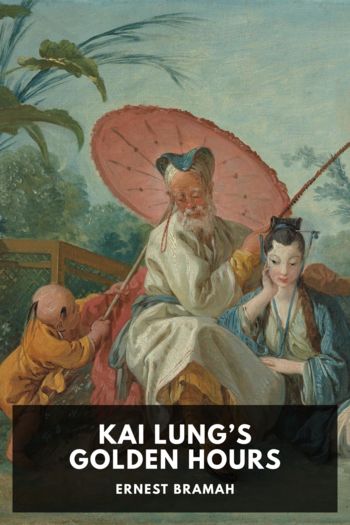Kai Lung’s Golden Hours - Ernest Bramah (the reading strategies book .TXT) 📗

- Author: Ernest Bramah
Book online «Kai Lung’s Golden Hours - Ernest Bramah (the reading strategies book .TXT) 📗». Author Ernest Bramah
“My ears are widely opened towards your auspicious words, benevolence,” replied Lin.
“You, Cheng Lin, are still too young to be concerned with the question of Passing Beyond; your imperishable father is, one is compelled to say, already old enough to go. As regards both persons, therefore, the assumed virtue of one burial robe above another should be merely a matter of speculative interest. Now if some arrangement should be suggested, not unprofitable to yourself, by which one robe might be imperceptibly substituted for another—and, after all, one burial robe is very like another—”
“The prospect of deceiving a trustful and venerated sire is so ignoble that scarcely any material gain would be a fitting compensation—were it not for the fact that an impending loss of vision renders the deception somewhat easy to accomplish. Proceed, therefore, munificence, towards a precise statement of your openhanded prodigality.”
Indescribable was the bitterness of Shen Heng’s throat when Cheng Lin unfolded his burden and revealed the Wang Ho thousand-tael burial robe, with an unassuming request for the return of the purchase money, either in gold or honourable paper, as the article was found unsuitable. Shen Heng shook the rafters of the Golden Abacus with indignation, and called upon his domestic demons, the spirits of eleven generations of embroidering ancestors, and the illuminated tablets containing the High Code and Authority of the Distinguished Brotherhood of Coffin Cloth and Burial Robe Makers in protest against so barbarous an innovation.
Bowing repeatedly and modestly expressing himself to the effect that it was incredible that he was not justly struck dead before the sublime spectacle of Shen Heng’s virtuous indignation, Cheng Lin carefully produced the written lines of the agreement, gently directing the Distinguished Brother’s fire-kindling eyes to an indicated detail. It was a provision that the robe should be returned and the purchase money restored if the garment was not all that was therein stipulated: with his invariable painstaking loyalty Lin had insisted upon this safeguard when he drew up the form, although, probably from a disinclination to extol his own services, he had omitted mentioning the fact to Wang Ho in their recent conversation.
With deprecating firmness Lin directed Shen Heng’s reluctant eyes to another line—the unfortunate exaction of fifty taels in return for the guarantee that the robe should be permeated with the spirit of rejuvenation. As the undoubted embroiderer of the robe—one Min of the family of Hsi—had admittedly Passed Beyond almost with the last stitch, it was evident that she could only have conveyed by her touch an entirely contrary emanation. If, as Shen Heng never ceased to declare, Min was still somewhere alive, let her be produced and a fitting token of reconciliation would be forthcoming; otherwise, although with the acutest reluctance, it would be necessary to carry the claim to the court of the chief District Mandarin, and (Cheng Lin trembled at the sacrilegious thought) it would be impossible to conceal the fact that Shen Heng employed persons of inauspicious omen, and the high repute of coffin cloths from the Golden Abacus would be lost. The hint arrested Shen Heng’s fingers in the act of tearing out a handful of his beautiful pigtail. For the first time he noticed, with intense self-reproach, that Lin was not reclining on a couch.
The amiable discussion that followed, conducted with discriminating dignity by Shen Heng and conscientious humility on the part of Cheng Lin, extended from one gong-stroke before noon until close upon the time for the evening rice. The details arrived at were that Shen Heng should deliver to Lin eight-hundred and seventy-five taels against the return of the robe. He would also press upon that person a silk purse with an onyx clasp, containing twenty-five taels, as a deliberate mark of his individual appreciation and quite apart from anything to do with the transaction on hand. All suggestions of anything other than the strictest high-mindedness were withdrawn from both sides. In order that the day should not be wholly destitute of sunshine at the Golden Abacus, Lin declared his intention of purchasing, at a price not exceeding three taels and a half, the oldest and most unattractive burial robe that the stock contained. So moved was Shen Heng by this delicate consideration that he refused to accept more than two taels and three-quarters. Moreover, he added for Lin’s acceptance a small jar of crystallized limpets.
To those shortsighted ones who profess to discover in the conduct of Cheng Lin (now an official of the seventeenth grade and drawing his quarterly sufficiency of taels in a distant province) something not absolutely honourably arranged, it is only necessary to display the ultimate end as it affected those persons in any way connected.
Wang Ho thus obtained a burial robe in which he was able to repose absolute confidence. Doubtless it would have sustained him to an advanced age had he not committed self-ending, in the ordinary way of business, a few years later.
Shen Heng soon disposed of the returned garment for two thousand taels to a person who had become prematurely wealthy owing to the distressed state of the Empire. In addition he had sold, for more than two taels, a robe which he had no real expectation of ever selling at all.
Min, made welcome at the house of Mean and Lin, removed with them to that distant province. There she found that the remuneration for burial robe embroidery was greater than she had ever obtained before. With the money thus amassed she was able to marry an official of noble rank.
The father of Cheng Lin had passed into the Upper Air many years before the incidents with which





Comments (0)